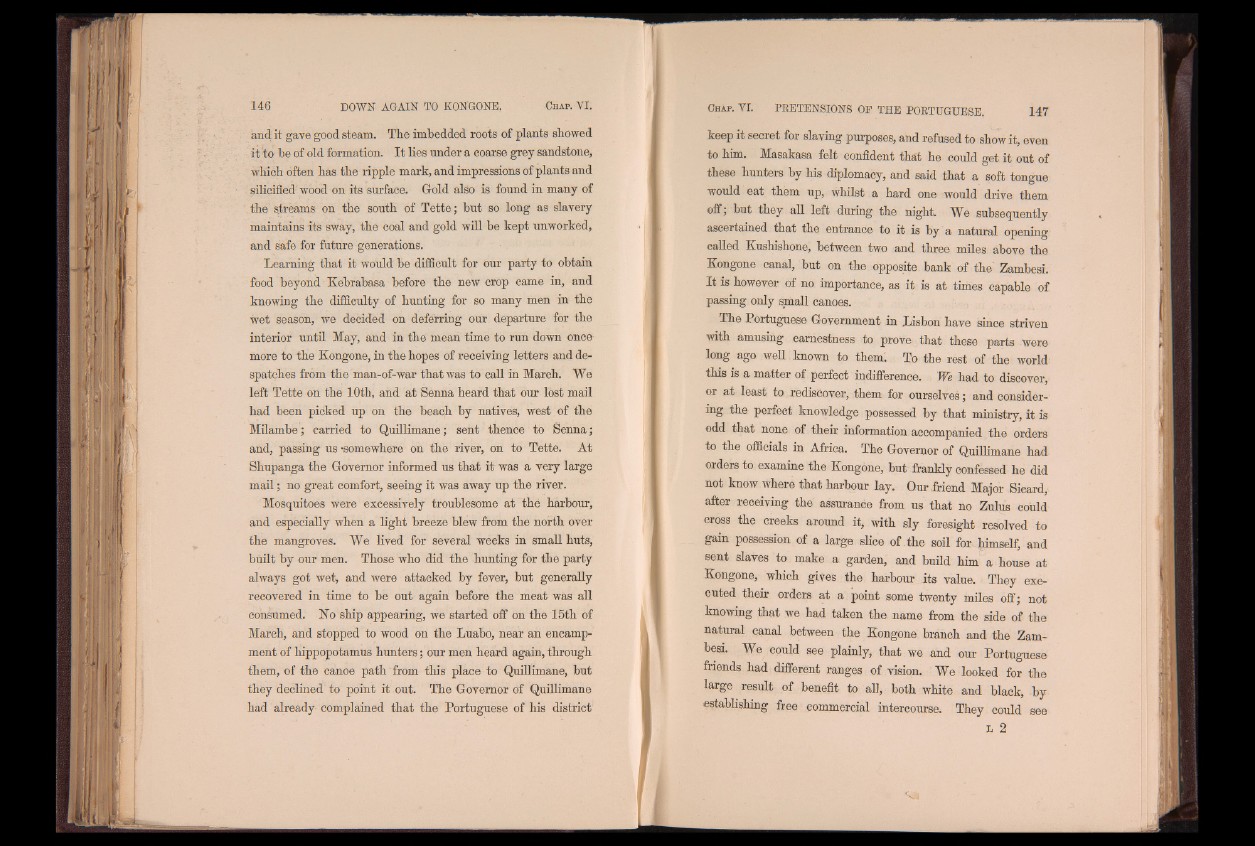
and it gave good steam. The imbedded roots of plants showed
it to he of old formation. I t lies under a coarse grey sandstone,
which often has the ripple mark, and impressions of plants and
silicified wood on its surface. Gold also is found in many of
the streams on the south of Tette; hut so long as slavery
maintains its sway, the coal and gold will be kept unworked,
and safe for future generations.
Learning that it would he difficult for our party to obtain
food beyond Kebrabasa before the new crop came in, and
knowing the difficulty of hunting for so many men in the
wet season, we decided on deferring our departure for the
interior until May, and in the mean time to run down once
more to the Kongone, in the hopes of receiving letters and despatches
from the man-of-war that was to call in March. We
left Tette on the 10th, and at Senna heard that our lost mail
had been picked up on the beach by natives, west of the
Milambe ; carried to Quillimane ; sent thence to Senna ;
and, passing us ‘somewhere on the river, on to Tette. At
Shupanga the Governor informed us that i t was a very large
mail ; no great comfort, seeing it was away up the river.
Mosquitoes were excessively troublesome at the harbour,
and espècially when a light breeze blew from the north over
the mangroves. We lived for several weeks in small huts,
built by our men. Those who did the hunting for the party
always got wet, and were attacked by fever, but generally
recovered in time to be out again before the meat was all
consumed. Mo ship appearing, we started off on the 15th of
March, and stopped to wood on the Luabo, near an encampment
of hippopotamus hunters ; our men heard again, through
them, of the canoe path from this place to Quillimane, but
they declined to point it out. The Governor of Quillimane
had already complained that the Portuguese of his district
keep it secret for slaving purposes, and refused to show it, even
to him. Masakasa felt confident that he could get it out of
these hunters by his diplomacy, and said that a soft tongue
would eat them up, whilst a hard one would drive them
off; but they all left during the night. We subsequently
ascertained that the entrance to it is by a natural opening
called Eushishone, between two and three miles ahove the
Kongone canal, but on the opposite bank of the' Zambesi.
It is however of no importance, as it is at times capable of
passing only small canoes.
The Portuguese Government in Lisbon have since striven
with amusing earnestness to prove that these parts were
long ago well known to them'. To the rest of the world
this is a matter of perfect indifference. We had to discover,
or at least to rediscover, them for ourselves; and considering
the perfect knowledge possessed by that ministry, it is
odd that none of their information accompanied the orders
to the officials in Africa. The Governor of Quillimane had
orders to examine the Kongone, but frankly confessed he did
not know where that harbour lay. Our friend Major Sieard,
after receiving the assurance from us that no Zulus cohld
cross the creeks around it, with sly foresight resolved to
gain possession of a large slice of the soil for himself, and
sent slaves to make a garden, and build him a house at
Kongone, which gives the harbour its value. They executed
their orders at a point some twenty miles off; not
knowing that we had taken the name from the side of the
natural canal between the Kongone branch and the Zambesi.
We could see plainly, that we and our Portuguese
friends had different ranges of vision. We looked for the
large result of benefit to all, both white and black, by
establishing free commercial intercourse. They could see
L 2